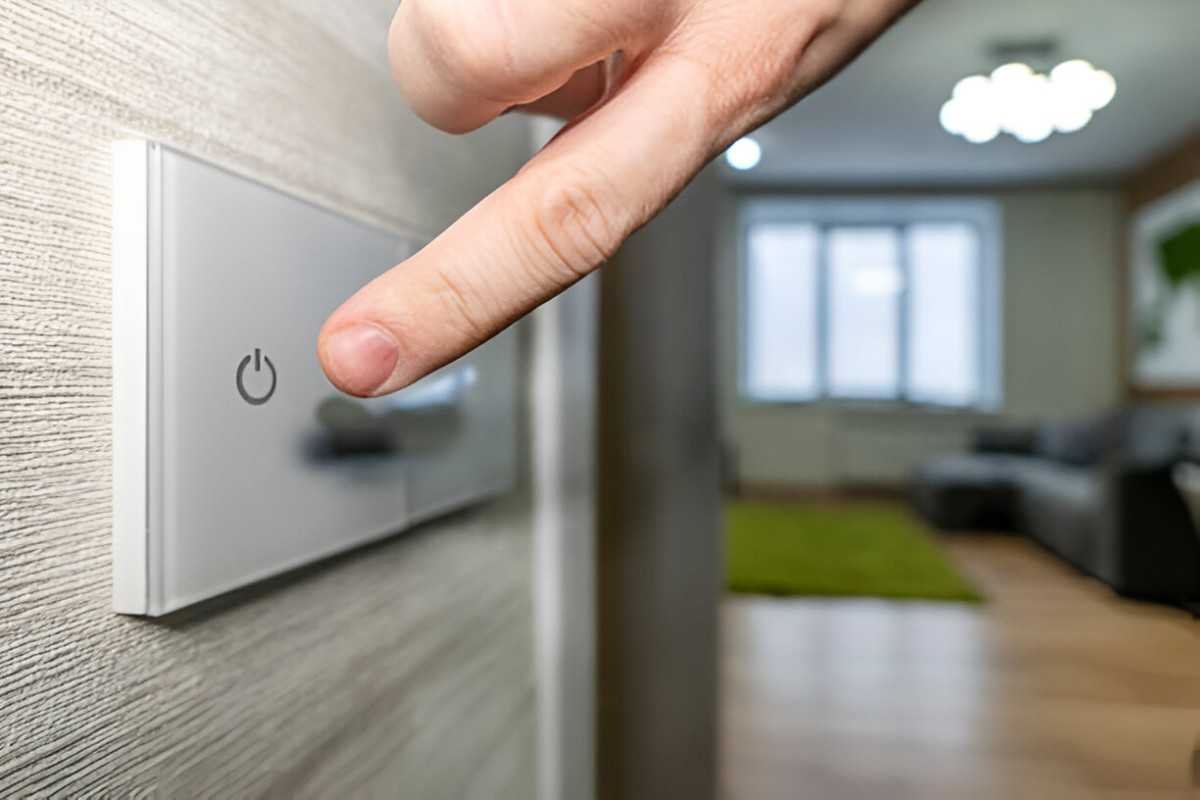In today’s world, smart home devices are becoming more than just a luxury. They’ve evolved into practical tools that improve the convenience, energy efficiency, and security of our homes. Among these devices, smart light switches are gaining popularity. But with so many options available, selecting the right one can be a daunting task.
I’ve spent a significant amount of time researching smart light switches, trying various brands and models, and learning about their features. In this guide, I will walk you through everything you need to know about choosing the best smart light switch for your home, highlighting the key features to look out for, comparing top brands, and offering practical tips to make an informed decision.
Table of Contents
What Is a Smart Light Switch?
A smart light switch is simply a replacement for your regular light switch that connects to your home Wi-Fi network. It lets you control your lights remotely, whether you’re at home or away. These switches come with a variety of features, such as scheduling, automation, voice control, and integration with other smart home devices.
Why You Should Upgrade to a Smart Light Switch
There are several compelling reasons to switch to a smart light switch:
- Convenience: You can control your lights from anywhere using a smartphone app. Whether you’re lounging on the couch or halfway across town, you can turn your lights on or off with ease.
- Energy Efficiency: With smart switches, you can set schedules to automatically turn lights off when not needed, preventing unnecessary energy consumption.
- Home Security: You can simulate occupancy when you’re away by scheduling lights to turn on and off, giving the impression that someone is at home.
- Voice Control: If you have voice assistants like Amazon Alexa, Google Assistant, or Apple HomeKit, smart light switches allow for hands-free control.
Key Features to Look for in a Smart Light Switch
When shopping for a smart light switch, here are some important features to consider:
1. Compatibility
Ensure that the smart light switch you choose is compatible with your existing setup. Most smart light switches work with standard single-pole switches, but if you have a three-way switch setup, you’ll need a specific model designed for that purpose.
2. Connectivity
Smart switches typically use Wi-Fi or Zigbee to communicate with your other smart devices. If you already have a Zigbee hub or a smart home ecosystem like Amazon Alexa or Google Assistant, you might prefer switches that integrate seamlessly with that ecosystem.
3. App Control
Some smart light switches come with their own proprietary app, while others integrate with popular smart home apps. Having an intuitive app is crucial for ease of use.
4. Voice Control
If you rely on voice assistants, make sure the smart switch is compatible with Alexa, Google Assistant, or Apple HomeKit. This feature can save you time and effort.
5. Automation & Scheduling
Look for switches that allow you to set schedules for when your lights should turn on or off. Some even let you automate lighting based on motion detection.
6. Design and Size
Smart light switches come in various designs. You’ll need to pick one that fits your existing décor and standard electrical box size.
7. Energy Monitoring
Some smart switches provide energy consumption data. This feature can be useful for tracking your electricity usage and identifying ways to save on energy bills.
How to Choose the Right Smart Light Switch
Now that we know what to look for, let’s break down the process of choosing the right smart light switch for your home.
1. Assess Your Needs
The first step is to assess what you need from your smart switch. Do you want basic control or advanced features like energy monitoring and automation? Also, think about whether you need to control lights in a single room, multiple rooms, or an entire house.
2. Check for Compatibility
Before purchasing a smart light switch, verify that it’s compatible with your home’s wiring and electrical setup. Some switches work only with certain systems, such as 2-wire or 3-wire connections.
3. Consider the Ecosystem
If you already use a smart home ecosystem like Amazon Alexa, Google Home, or Apple HomeKit, choose a switch that integrates with that system for the best experience.
4. Evaluate the Features
Do you want remote control, scheduling, or voice activation? Some switches are packed with extra features like customizable lighting scenes or geofencing (which turns lights on when you’re near home).
5. Read Reviews
Reading customer reviews can give you a good sense of whether a smart light switch is reliable, easy to install, and user-friendly. Check for any issues that people commonly face, such as connectivity problems or app malfunctions.
6. Set Your Budget
Prices for smart light switches can vary greatly. Basic models can cost as little as $15–$25, while high-end models with advanced features can cost $50 or more. Determine how much you’re willing to spend based on your requirements.
Top Smart Light Switch Brands: A Comparison
Let’s take a look at some of the leading smart light switch brands on the market today. Here’s a comparison of their features:
| Brand | Price Range | Compatibility | App Control | Voice Control | Energy Monitoring | Notable Features |
|---|---|---|---|---|---|---|
| Lutron Caseta | $50–$80 | Alexa, Google Home | Lutron App | Yes | No | Reliable, easy to install |
| TP-Link Kasa | $20–$40 | Alexa, Google Home | Kasa Smart | Yes | Yes | Budget-friendly, good app |
| Leviton Decora | $35–$65 | Alexa, Google Home | My Leviton | Yes | No | Sleek design, reliable performance |
| Wemo | $30–$50 | Alexa, Google Home | Wemo App | Yes | No | Affordable, great for simple setups |
| Lutron RadioRA 2 | $100+ | Alexa, Google Home | Lutron App | Yes | Yes | Premium features, whole-home solution |
1. Lutron Caseta
Lutron is widely regarded as a leader in home automation. The Caseta series is known for its reliability and ease of installation. The switches work seamlessly with Alexa and Google Home, but they don’t offer energy monitoring. The Lutron Caseta is great if you’re looking for a premium, hassle-free experience.
2. TP-Link Kasa
TP-Link Kasa is a great budget-friendly option. It works well with Alexa and Google Assistant, and it also features energy monitoring. The app is easy to use, and setup is simple. If you’re new to smart switches and want an affordable option that doesn’t compromise on functionality, the Kasa switches are a solid choice.
3. Leviton Decora
Leviton’s Decora smart switches are sleek and modern, making them a good fit for contemporary homes. They are easy to install and come with features like scheduling and voice control. However, they do not offer energy monitoring, which could be a deal-breaker for some users.
4. Wemo
Wemo, by Belkin, is another affordable brand that works well with Amazon Alexa and Google Assistant. It doesn’t come with all the bells and whistles of other models, but it’s reliable and easy to set up. If you just need basic voice control and remote access, Wemo is a solid option.
5. Lutron RadioRA 2
Lutron’s RadioRA 2 system is a high-end, whole-home automation solution. It’s suitable for larger homes or those with more complex automation needs. It offers advanced features like energy monitoring and integrates seamlessly with other smart home systems. However, it comes with a hefty price tag.
Installation Process
The installation process of a smart light switch typically involves replacing your existing switch. If you’re comfortable working with electricity, you can install the switch yourself. However, if you’re unsure, it’s a good idea to hire a licensed electrician.
The steps are usually as follows:
- Turn off the power at the breaker box.
- Remove the old switch by unscrewing it and disconnecting the wires.
- Connect the new smart switch to the same wires.
- Secure the switch into the wall and replace the cover plate.
- Turn the power back on and follow the setup instructions provided by the app.
Final Thoughts
Choosing the best smart light switch depends on your specific needs and budget. If you’re looking for a high-quality, reliable switch, brands like Lutron and Leviton offer great options. However, if you’re on a budget, TP-Link Kasa and Wemo are excellent choices for basic functionality.
Before making a decision, think about the features that are most important to you, such as voice control, energy monitoring, and app compatibility. With a little research, you’ll be able to find the best smart light switch to suit your home and lifestyle.
In conclusion, a smart light switch can offer convenience, energy savings, and even enhanced security. By evaluating the features, brands, and installation processes, you can confidently choose the best option for your home. Happy smart-switching!





